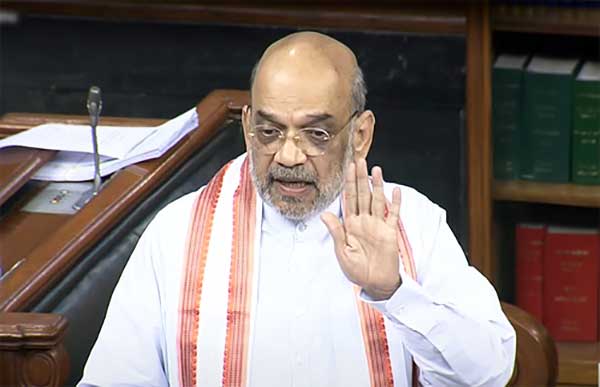The Centre on Friday introduced three bills in the Lok Sabha which completely overhauls the British-era Indian criminal laws, the Indian Penal Code (1860), Code of Criminal Procedure (1898), and the Indian Evidence Act (1872).
Home Minister Amit Shah introduced the Bharatiya Nyaya Sanhita Bill, 2023 which seeks to replace the IPC, the Bharatiya Nagrik Suraksha Sanhita Bill, 2023 which seeks to replace the CrPC and the Bharatiya Sakshya Bill, 2023 which seeks to replace the Indian Evidence Act in the Lok Sabha on the last day of the monsoon session.
Referring to the three bills for consideration of the Parliamentary standing committee on home affairs, Shah said that the earlier laws strengthened British rule, while the proposed laws will protect the rights of the citizens and give speedy justice to the people.
A new offence on acts of secession, armed rebellion, subversive activities, separatist activities or endangering sovereignty or unity and integrity of India has been added in the revised laws.
The sedition law "has been repealed", the home minister said.
The word "sedition" is not in the proposed law. It is replaced by Section 150 for acts endangering sovereignty, unity and integrity of India.
"Whoever, purposely or knowingly, by words, either spoken or written, or by signs, or by visible representation, or by electronic communication or by use of financial means, or otherwise, excites or attempts to excite, secession or armed rebellion or subversive activities, or encourages feelings of separatist activities or endangers sovereignty or unity and integrity of India; or indulges in or commits any such act shall be punished with imprisonment for life or with imprisonment which may extend to seven years and shall also be liable to fine," it says.
Shah said the Centre will also introduce the provision of capital punishment in mob lynching cases.
On punishment, the home minister said that under the new laws, the intention is protection of Constitutional justice and not to punish. Punishment is to be given only when an example is to be made.
"The laws that will be repealed... the focus of those law was to protect and strengthen the British administration, the idea was to punish and not to give justice. By replacing them, the new three laws will bring the spirit to protect the rights of the Indian citizen," Shah said in the Lok Sabha.
"The aim will not be to punish, it will be to provide justice. Punishment will be given to create a sentiment of stopping crime," he added.
The death sentence has been retained in the new bills.
The explanation states this: "Comments expressing disapprobation of the measures, or administrative or other action of the Government with a view to obtain their alteration by lawful means without exciting or attempting to excite the activities referred to in this section."
The legislations also prioritise laws for crimes against women and children, murders and "offences against the state".
For the first time, community service will be one of the punishments for petty offences.
Also, offences have been made gender neutral. In order to deal effectively with the problem of organised crimes and terrorist activities, new offences of terrorist acts and organised crime have been added with deterrent punishments.
The fines and punishment for various offences have also been enhanced.
The home minister said that 475 colonial references have been removed.
He further informed that the bill has been referred to the Parliamentary panel for home affairs so that it can be examined by all lawmakers and also the bar councils and Law Commission.
The new bills were exhaustively discussed during the past four years and 158 meetings were held to finalise the bills, with all the concerned stakeholders.






3 satellite townships to be developed in Tripura: CM Manik Saha
Addressing the district level workshop on the deliberations of the 4th National Conference of Chief Secretaries at Rajarshi Hall in southern Tripura’s Udaipur, the Chief Minister said that these satellite townships would be developed in a planned manner with all basic facilities.
Assam Police foils drug peddling bid; narcotics worth Rs. 30 crore seized
Assam Police foiled a major drug peddling bid and narcotics worth Rs 30 crore were seized by the security personnel, Chief Minister Himanta Biswa Sarma said on Tuesday.
Country will prosper only when man and women enjoy equal rights: Minister Tinku Roy
The state social welfare and social education minister Tinku Roy on Tuesday chaired a daylong workshop on different schemes of his department and its execution and said that the country can prosper only if men and women enjoys equal rights.
Minister Sudhangshu Das emphasis on piggery to strengthen rural economy and generate employment opportunity
The Animal Resource Development Department minister Sudhangshu Das on Tuesday attended the state level seminar on “Pig Diseases with Special Reference to Classical Swine Fever”, held here at Agartala Rabindra Bhavan
Govt officials are driving force of Tripura’s development: CM Dr Manik Saha
Chief Minister Dr Manik Saha on Tuesday attended the District Level Workshop on the 4th National Conference of Chief Secretaries' deliberations at Rajarshi Hall, in Udaipur and said that government is committed to implementing key takeaways for the welfare of the people of Tripura.
Youth dies after being run over by train
A tragic incident unfolded once again in the D.M. Colony area under the Teliamura Railway Police Station, where a man lost his life after being run over by a train. The deceased has been identified as Ajit Sarkar, a 36-year-old resident of the locality.
Govt aims to transform state into an education hub: CM Manik Saha
Dr. Saha said this while addressing the foundation day celebration of Lipika Dasgupta Memorial School at its premises in East Gakulnagar, Bishalgarh, Sepahijala District.
Five Bangladeshi held with fake Aadhaar cards in Udaipur
The Government Railway Police (GRP) in Udaipur, Gomati district, have detained five Bangladeshi nationals with forged Aadhaar cards after they illegally entered Tripura and attempted to travel to Gujarat in search of work.